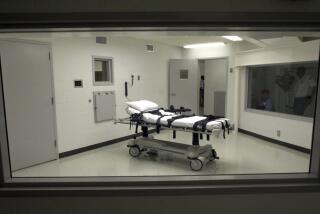Judge Visits San Quentin Execution Site
In a highly unusual move, a federal judge on Thursday personally examined the execution chamber at San Quentin State Prison as part of a legal challenge to the state’s lethal injection procedure.
U.S. District Judge Jeremy Fogel, whose rulings on the lethal injection challenge triggered an 11th-hour halt to Michael A. Morales’ execution in February, told attorneys who accompanied him that the tour was “very useful to me.”
Fogel made no rulings, but spent about 3 1/2 hours at the prison with prosecutors, defense lawyers, prison personnel and two journalists.
Morales has been on death row since 1983, when he was convicted of torturing, raping and murdering Terri Winchell, a 17-year-old Lodi high school student.
His lawyers argue that California’s three-stage cocktail of a sedative, a paralytic drug and a heart-stopping chemical -- the same protocol used in 37 of the 38 states with lethal injection -- could mask, rather than eliminate, an inmate’s pain during execution.
Earlier this year, they presented evidence that six people executed at San Quentin might not have been fully unconscious when the final lethal chemical was injected into them. The heart-stopping drug can cause intense pain. The issue has been raised in other states, temporarily halting several other executions. But no court has banned the procedure.
Fogel in February agreed that the state’s methods could inflict an unconstitutional level of pain and said prison officials would have to modify the procedure or submit to a full-blown court hearing. Fogel urged the state to use two anesthesiologists to make sure that Morales was unconscious before the second and third drugs were administered.
The state lined up two anesthesiologists, but on the eve of the execution they backed out, citing medical ethics codes that bar physicians from participating in executions.
Fogel then ordered the state to find a licensed medical professional to administer the drugs. But prison officials could not find one, and the execution was called off.
The judge has scheduled two days of hearings starting May 2 on lethal injections and pain.
In early March, the state submitted a new lethal injection protocol to the judge under seal and then released an edited version to the public March 16.
That 32-page protocol describes the type of leather restraints and leg irons that are used but does not explain how prison personnel will monitor whether the condemned inmate is fully unconscious and therefore insensitive to pain, Morales’ attorneys say.
Court papers submitted by the California attorney general’s office say state officials have changed the process to ensure that the inmate receives a constant flow of a barbiturate “until death is pronounced.” And they say a state physician will use heart-monitoring equipment to assess when the condemned inmate is dead based on “a flat-line EKG.”
At San Quentin on Thursday, Fogel spent about an hour and a half looking at the execution chamber and the anteroom where the drugs, syringes, intravenous lines and other equipment were laid out just as they would be on the night of an execution, according to two reporters who joined the tour.
Deputy Atty. Gen. Dane Gillette spent about an hour questioning the leader of the execution team, who has taken part in nine executions, said Howard Mintz of the Mercury News in San Jose, one of the two reporters who attended the hearing. Mintz said the bulk of the questions dealt with the logistics of the execution process.
“It was all focused on the mechanics.... It was how they would administer the [drugs].... There was no discussion of the medical impact on the inmate,” Mintz said.
Mintz said that, whenever a defense lawyer attempted to ask anything about the background or qualifications of members of the execution team, Gillette objected and the judge upheld those objections.
Los Angeles attorney David Senior, one of Morales’ lawyers, said in an interview afterward that he still hoped to probe these areas in the coming weeks. Senior said he would attempt to take depositions of members of the execution team before the May 2 hearing.
Senior’s co-counsel, San Francisco attorney John R. Grele, said he believes that the state’s new protocol has not solved the problems with the lethal injection procedure.
“I think we have all of the same problems we had before,” Grele said. He said the state could solve the problem by using a fatal dose of one sedative in place of the three-stage drug protocol.
More to Read
Sign up for Essential California
The most important California stories and recommendations in your inbox every morning.
You may occasionally receive promotional content from the Los Angeles Times.










